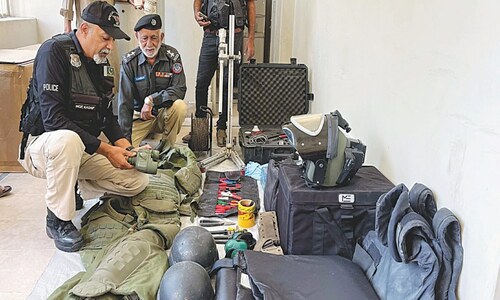KARACHI: The day-long Second International Conference on Special Education with the theme of ‘The Future is Accessible’, organised by the Department of Special Education of the University of Karachi here on Tuesday, was aimed at building a network for persons with disabilities to integrate them into society and uplift them.
“Over a billion people globally have some form of disability and inaccessibility, but they can participate and enjoy the benefits of technological advancement for their education, employment, social interaction and leisure time,” said Dr Humera Aziz, chairperson, Department of Special Education, during her welcome address.
Dr Nasir Sulman, dean, Faculty of Education, encouraged young people, especially the students of the university to show that they care by bridging the gap felt by persons with disabilities in their quest for education and accessibility. “You should care for those who cannot care for themselves,” he said.
‘These devices are bringing changes in the lives of individuals with exceptionalities’
The guest of honour, Dr Aftab Alam Khan, assistant professor of Special Education at the College of Education and Human Services, Longwood University, Virginia, USA, presented the keynote address. “As special educators we need to be thoughtful and creative in making the future of individuals with exceptionalities accessible. For example, there should be a good advocate for their rights and opportunities. This requires a thorough understanding of their abilities.
“I encourage our fellow special educators to have a greater understanding of assessment procedures and to run multiple assessment instruments to get an unbiased result. This allows us to understand the potential and abilities of individuals with exceptionalities. This also helps us to identify some roadblocks that impede them in achieving success in their lives and leads us to make better planning for them. However, when creating an educational plan, it is desirable to choose evidence-based support programmes,” he said.
He added that in the present era, technology has made lives easier, accessible and better than before. “I highly encourage using technology to make their lives better and accessible. There are numerous low- and high-tech devices available in this contemporary world. These devices are bringing changes in the lives of individuals with exceptionalities,” he said.
KU to offer free courses
University of Karachi’s acting Vice Chancellor Prof Dr Khalid Mahmood Iraqi, meanwhile, said that the university will offer free courses with maximum facilities to persons with disabilities who are keen to take admissions there. He also directed the dean, Faculty of Education, Prof Dr Nasir Sulman to prepare PC-I for the construction of the building for the special education department.
“I can imagine the pain of parents and siblings of a special person who watch them suffer throughout their lives. In fact, these people have to live a very different and more challenging life than normal people,” he said.
He said that usually the families of special persons remain largely unaware of facilities and welfare policies offered to them. “I feel that there is a need to adequately publicise the benefits the social welfare departments of provincial and federal governments offer to special people and their families,” he said while also suggesting that some literature about the issues and needs of the persons with disabilities be included in the education system at the school and college levels.
Prof Dr Nabeel Ahmed Zubairi of KU’s Department of Sociology said that around 15 per cent of the world’s population lived with some kind of disability whereas 5.04 million Pakistanis face disability problems.
He said that this figure was larger than the combined population of Multan, Hyderabad and Peshawar.
Irfan Ali, a sports physical therapist with the FIFA Medical Centre of Excellence in Dubai, pointed out that a poor posture while sitting led to an imbalance of weight distribution that can lead to the development of pressure ulcers and other severe physical complications.
Dr Humera Bano, assistant professor at the Department of Special Education at the University of Punjab, spoke about the challenges faced by students with visual impairment in taking examination.
Shakeel Ahmed Khan of the American Board of Disability reflected his thoughts on the new frontiers to explore by speech language pathologists in the management of dysphagia in Pakistan.
Dr Farhat Khanam, assistant professor at the Department of Special Education at the Federal Urdu University of Arts, Science and Technology, spoke on the use of hearing aid and its impact on communication and the academic performance of children with hearing impairment who also hail from a low social economic background.
Several more papers were presented throughout the day. Dr Saira Saleem, conference coordinator, gave the vote of thanks.
Published in Dawn, June 12th, 2019














































Dear visitor, the comments section is undergoing an overhaul and will return soon.